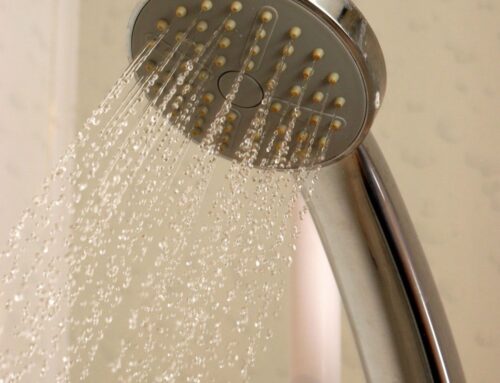Every homeowner should have a basic toolkit for the maintenance and home improvement tasks that come with homeownership. But if you step into a home improvement store, the sheer volume of tools available can be a bit overwhelming, so what do you really need in your toolbox at home? Below are 20 tools that every homeowner should have on-hand to make home maintenance tasks easier to do.
Tape Measure
From measuring rooms for furniture or appliances to measuring wood to cut for projects, a tape measure is an absolute must for every toolbox. There are many options available, but the ideal tape measure according to experts is an easy-locking 3/4-inch wide model that is at least 25 feet long.
Hammer(s)
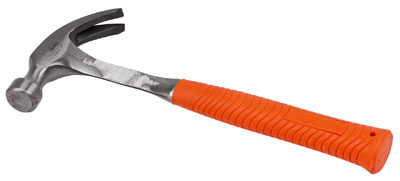 Want to hang a picture? Remove nails from a wall? Maybe do some demolition as you remodel parts of your home? You’re going to need a hammer (or perhaps hammers). Start with a 16-ounce claw hammer, which is versatile enough to do most, if not all jobs around the home. Find one with a comfortable grip, and you may want to consider a hammer with vibration-dampening coatings. Other hammers to consider adding to your toolbox are a ball-peen hammer, which are great for working with metal, and a sledge hammer if you will be doing demolition work or need to break concrete or rocks.
Want to hang a picture? Remove nails from a wall? Maybe do some demolition as you remodel parts of your home? You’re going to need a hammer (or perhaps hammers). Start with a 16-ounce claw hammer, which is versatile enough to do most, if not all jobs around the home. Find one with a comfortable grip, and you may want to consider a hammer with vibration-dampening coatings. Other hammers to consider adding to your toolbox are a ball-peen hammer, which are great for working with metal, and a sledge hammer if you will be doing demolition work or need to break concrete or rocks.
Cordless Drill with Interchangeable Bits
One of the easiest to use and most versatile power tools is the cordless drill. In fact, it is likely your drill will become the most-used item in your tool collection. In order to get the most use out of it, make sure to get an assortment of drill bits that can work in all types of projects. Look for metal bits, wood drill bits, and universal drill bits, and spend money on good-quality bits that will last you a while. Consider also purchasing screwdriver bits and extra batteries to get the most out of your drill.
Screwdriver Set or Multi-Bit Screwdriver
Speaking of screwdrivers, this is another must-have for any toolkit. Either get a set that has a variety of flathead and Phillips head sizes or a screwdriver that has interchangeable bits. At a minimum, it is best to have a small and a large version of both a flathead and Phillips head screwdriver. This will give you what you need for a variety of projects and screw sizes. But what if you have a screwdriver bit set for your drill? It is still wise to have manual screwdrivers, which can reach into more places and are less likely to damage a screw.
Set of Pliers
Pliers are another essential for home maintenance needs thanks to their versatile uses. The primary use is to grip things, but you can also use them to remove stubborn old hardware, straighten bent items, slice wiring, and more. Options include slip-joint, needle-nose, lineman, tongue and groove, and vise-grips (locking). Getting a set that includes all of these will give you maximum versatility. Slip-joint are adjustable and good for gripping nails, nuts, bolts, and more. Needle-nose pliers are great for hard-to-reach areas. Lineman pliers cut and twist wires. With a wide jaw capacity and longer handles to reach between pipes, tongue and groove pliers (also known as water pump pliers) are perfect for plumbing jobs. They grip and turn pipes, fitting, fasteners, and more. The adjustable jaw on Vise-grips (also known as locking) can lock in place, freeing up both hands to do hard work. They are also great for loosening especially tight items (just use caution and pay attention because you can damage nuts and other items if you are not careful).
Combination Wrench Set
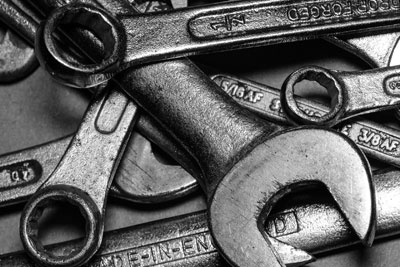 Wrenches are needed to tighten or loosen hex nuts and bolts. With one end open and the other closed, combination wrenches will give you maximum versatility. At the very least, you’ll want a few adjustable wrenches in different sizes, but if you want to make sure you are fully covered for any job, buy a complete set in both standard and metric sizes.
Wrenches are needed to tighten or loosen hex nuts and bolts. With one end open and the other closed, combination wrenches will give you maximum versatility. At the very least, you’ll want a few adjustable wrenches in different sizes, but if you want to make sure you are fully covered for any job, buy a complete set in both standard and metric sizes.
Allen Wrench Key Set
If you’ve ever assembled a bookcase or similar furniture, you have most likely used an Allen wrench (also known as hex keys). These wrenches are used to turn bolts and screws with hexagonal sockets. Adding a set of these wrenches to your toolbox will ensure you always have one that fits the bolts and screws on various projects.
Wire Cutters/Strippers
If you will be doing electrical repairs or even some craft projects, wire cutters/strippers are essential. Though you can buy a wire cutter or stripper separately, it is best to buy a combination tool that can do both, which can handle aluminum, copper, brass, iron, and steel. Due to the work being done with the tool, a cushioned grip is recommended.
Utility Knife
This versatile tool will get a ton of use because it can cut through thick materials. In addition to opening packages, you can use it to cut through cardboard, rope, foam, rubber, carpet, and more. Get a retractable knife for best overall usage and storage.
Putty or Painter’s Knife
At some point, every homeowner is going to do spackling on small areas of drywall, such as filling in nail holes. An angled putty knife or painter’s knife is much needed for this project, but that’s not the only place it can be useful. You can also use a putty knife to scrape off peeling paint or wallpaper, chip off dried paint or spackle, or reglaze a window.
Caulking Gun
If there’s one certainty in homeownership it’s that caulking will deteriorate, crack, or fall off. To tackle missing or damaged caulking, you’ll want a caulking gun. Use it to re-caulk around windows and doors and for larger projects in your kitchen and bathroom.
Stud Finder
Planning to mount a TV on your wall? Hang a heavy mirror or art piece? How about adding a floating shelf? If you plan on doing any of these or hang anything else that is heavy on your walls, it is best to anchor it into a stud to prevent it from pulling out of the wall. That’s where a stud find comes in handy. Most experts suggest a magnetic stud finder that tend to be more accurate than electronic ones, which can sometimes give false readings particularly on textured walls. Bonus benefit: It opens the door for the old “found the stud” while holding the stud finder to your chest Dad joke (come on, you know you all have done it!).
Level(s)
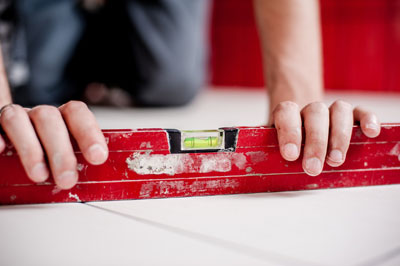 Want to make sure that picture or shelf you’re hanging is straight and level? Well, you need a level. This handy tool can make any project, be it a small one like hanging a picture or a bigger one like installing cabinets or appliances, much quicker and easier. Though you can get away with just one level in your toolbox, some experts suggest having two: a short one that is six to eight inches long and a larger one that is four feet long. This will give you options for various projects. If you do a lot of home-improvement projects, you may also want to consider a laser level, which projects a laser beam on a wall, giving you a hands-free, accurate way to level things out.
Want to make sure that picture or shelf you’re hanging is straight and level? Well, you need a level. This handy tool can make any project, be it a small one like hanging a picture or a bigger one like installing cabinets or appliances, much quicker and easier. Though you can get away with just one level in your toolbox, some experts suggest having two: a short one that is six to eight inches long and a larger one that is four feet long. This will give you options for various projects. If you do a lot of home-improvement projects, you may also want to consider a laser level, which projects a laser beam on a wall, giving you a hands-free, accurate way to level things out.
Nails and Screws
Have you ever been midway through a project only to discover you don’t have the right screw or need a nail you don’t have? Keep a selection of nails and screws on-hand so you don’t have to drop everything in the middle of a project to go to the hardware store (again). You can find these in prepackaged sets that give you a nice selection.
Drywall Anchor Kit
As mentioned under stud finder, it is best to mount heavier items on a stud, but for times when a stud isn’t available for lighter objects you want placed in a certain spot, drywall anchors are must-haves. Drywall is too brittle screw directly into, so insert an anchor first to provide a secure foundation for the screw to bite into. Look for a kit that offers a variety of options for use in drywall, both is sizes and styles of anchors.
Flashlight or Work Light
Sure, you have a flashlight on your cell phone, but that can be impractical at times (and isn’t helpful if you forget to charge the phone). It’s best to have a flashlight (or flashlights) or a work light on hand. These tools are great for times when the power goes out and for projects that require you to work in dark spaces. Consider getting a variety of flashlight sizes and a work light that can stand on its own for hands-free working.
Extension Cord
Trust us, you are going to need an extension cord at some point. Save yourself some headaches and just add it to your toolbox now. There are both indoor and outdoor options. If you think you will be using the extension cord outside, be sure to get one that says it is for outdoor use, which have more insulation and protection to withstand elements. Other things to consider when purchasing an extension cord is the job size, wire gauge, length, and number of prongs.
Plunger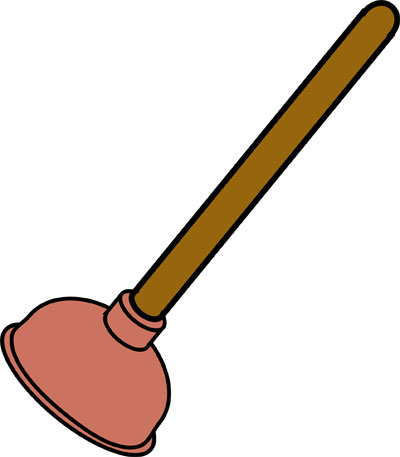
When you think “tools,” you probably don’t think about a plunger, but this is a must-have for every homeowner. If you have a clogged sink or tub, the first thing you’ll reach for is a plunger, which is the best option to unclog them and avoid costly plumbers.
Step Stool
Ever been working on a job that is just high enough to be out of reach but not so high that you need a full-size ladder? A step stool is your solution. It’s safer than using a chair or barstool and gives you a sturdy foundation to get the work done quicker. Step stools come in multiple options, but a three-step stool can handle most jobs.
Duct Tape and WD-40
Does it move and shouldn’t? Use duct tape. Should it move and doesn’t? Use WD-40. Though this is just an old joke about duct tape and WD-40 being the only tools you really need to fix anything, the reality is these two items are great to have in your toolbox to solve a lot of issues that may arise in your home.
Looking for your dream home? Liberty Homes has been building new homes in Utah for nearly 30 years. We take pride in our trade, crafting each home as if it were our own. Our quality, affordable homes are energy smart and thoughtfully personalized for your active Utah lifestyle. We currently have townhomes available in Salt Lake County and single-family homes in Heber City. Plus, 55-plus single-family homes coming soon in West Jordan. Contact us today to find your dream home.

Want home decorating and maintenance tips, craft ideas, recipes, and more delivered right to your inbox?
Sign up for our monthly newsletter:

